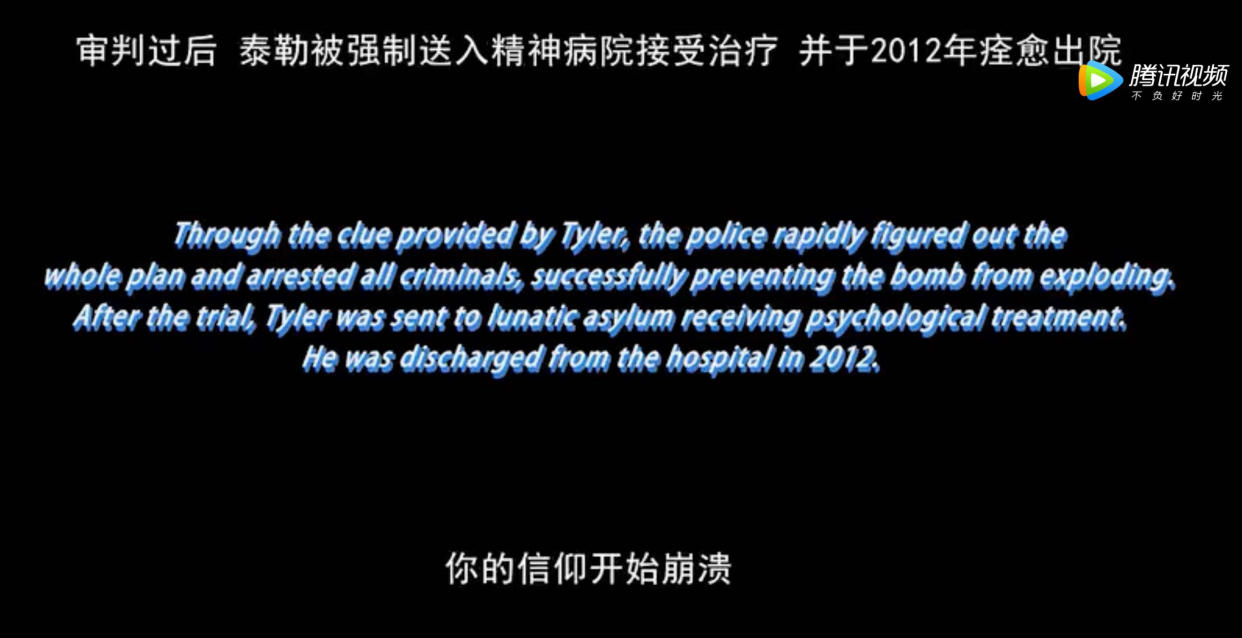Is 'Fight Club' still 'Fight Club' if the authorities win? Movie gets a new ending in China
HONG KONG — At the end of David Fincher’s 1999 dystopian movie “Fight Club,” the narrator watches as skyscrapers explode and collapse, a symbol of the film’s anarchic message.
Except on China's mainland.
There, the police foil the plan of Edward Norton’s protagonist thanks to his imaginary alter-ego Tyler Durden, played by Brad Pitt, who is sent to a “lunatic asylum” rather than being killed by Norton's character. It's an alternative ending that trades societal collapse for a more Beijing-friendly conclusion.
In a seemingly edited version of the movie on the Chinese streaming platform Tencent Video, the scene of the buildings falling apart is replaced by a black screen with white English writing reads: “The police rapidly figured out the whole plan and arrested all criminals, successfully preventing the bomb from exploding.”

The movie had garnered 27,000 views on the platform as of Wednesday, with 75 comments. Most of the comments, made in January, pointed out how the movie concluded differently than before.
“Cheers to the great, great censorship,” one viewer on Tencent Video said. Another commented, “The cut is outrageous!”
Posts about the change also sparked outrage on other Chinese social media websites. “Fight Club’s ending is not just removed, but also changed. Oh my god,” a user wrote on Weibo, a Twitter-like platform.
Not everyone appeared outraged, however.
“This is SUPER wonderful! Everyone gets a happy ending in China!,” Chuck Palahniuk, who wrote the book on which the movie is based, said on Twitter.
“Fight Club,” in one form or another, appears to be a favorite among Chinese audiences. On Douban, a popular community-based rating website, it was ranked 61st among all movies and given a 9.0 rating after votes from more than 700,000 people.
The unedited version of the movie remains available on some other Chinese websites, and it’s unclear why the ending was altered in this case.
Tencent Video and the Cyberspace Administration of China, the country’s internet censor, did not respond to requests for comment.
With the ruling Communist Party holding a heavy hand over popular culture, Hollywood movies are often edited to stay in line with Beijing’s policies.
Foreign films can only be made available in Chinese theaters through a local distributor. The process usually involves an agreement with the production studio, which mandates “provocative” parts of the work be altered or removed, according to Kenny Ng, an associate professor specializing in film censorship at Hong Kong Baptist University’s Academy of Film.
The “mental and physical violence” displayed in “Fight Club” make it an easy target for Chinese authorities, who may view it as a danger to “national security,” he said. He added that crime movies in China always conclude with the police beating the criminals.
With the Chinese streaming market being a largely unexplored territory, studios tend to appease the authorities’ wishes, he added.
Almost 30 minutes of “Lord of War” starring Nicholas Cage were similarly replaced on the Tencent streaming platform, according to screenshots shared on social media and Chinese-language news sites. Footage in which Cage’s arms dealer was found not guilty was replaced by a written epilogue explaining he confessed to his crimes and was imprisoned for life.
“You just cut out the scenes and abruptly add subtitles explaining what happened, the bad guys get arrested, or the bad guys get shut up in an asylum system,” Ng said. “Viewers will immediately detect this is a censored version. And they will also find ways to view the real, original version.”
